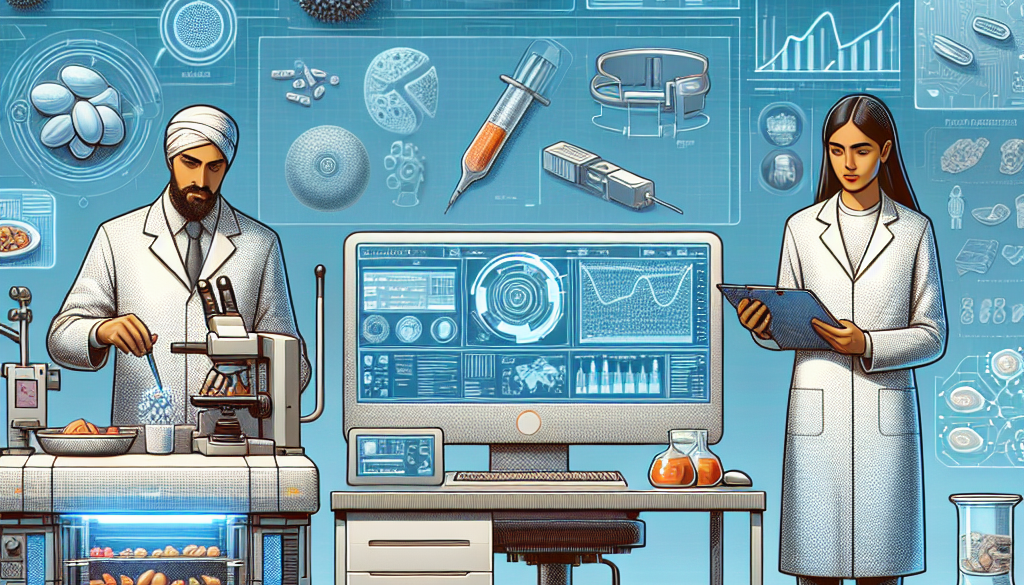Technological Advances in Food Safety
-
Table of Contents
- Technological Advances in Food Safety: Enhancing Consumer Protection
- Emerging Technologies in Food Safety
- Blockchain for Traceability
- Advanced Sensors and IoT
- Artificial Intelligence and Machine Learning
- Rapid Testing and Diagnostics
- Statistics Supporting Technological Impact on Food Safety
- Challenges and Future Directions
- Conclusion
- ETprotein: Your Partner in Food Safety and Quality
Technological Advances in Food Safety: Enhancing Consumer Protection

Food safety is a critical concern for consumers, producers, and governments worldwide. With the global food supply chain becoming increasingly complex, ensuring the safety and quality of food products is more challenging and important than ever. Technological advances play a pivotal role in addressing these challenges, offering innovative solutions to detect, prevent, and control foodborne hazards. This article explores the latest technologies revolutionizing the food safety industry and how they contribute to safeguarding public health.
Emerging Technologies in Food Safety
The food industry is undergoing a technological transformation, with cutting-edge innovations designed to enhance food safety at every stage of the supply chain. From farm to fork, these technologies provide new ways to detect contaminants, improve traceability, and ensure that food products are safe for consumption.
Blockchain for Traceability
Blockchain technology has emerged as a powerful tool for improving traceability in the food supply chain. By creating a decentralized and immutable ledger of transactions, blockchain enables all parties involved in the supply chain to access real-time data on the movement and origin of food products. This enhanced visibility helps in quickly identifying and addressing potential sources of contamination, thereby reducing the risk of foodborne illnesses.
Advanced Sensors and IoT
Sensors and the Internet of Things (IoT) are revolutionizing food safety monitoring. Smart sensors can detect a wide range of food safety hazards, including pathogens, chemicals, and physical contaminants. IoT devices enable remote monitoring of food storage conditions, such as temperature and humidity, ensuring that products are stored safely and reducing the risk of spoilage.
Artificial Intelligence and Machine Learning
Artificial intelligence (AI) and machine learning (ML) are being employed to predict and prevent food safety incidents. AI algorithms can analyze vast amounts of data to identify patterns and predict potential outbreaks of foodborne illnesses. Machine learning models can also optimize food safety protocols by learning from past incidents and suggesting improvements.
Rapid Testing and Diagnostics
Advancements in rapid testing and diagnostic technologies have significantly reduced the time required to detect foodborne pathogens. Portable and user-friendly testing kits enable on-site detection of contaminants, providing results in a matter of hours rather than days. This rapid response capability is crucial for preventing the spread of foodborne diseases.
Statistics Supporting Technological Impact on Food Safety
- According to a study by MarketsandMarkets, the global food safety testing market is projected to reach $24.6 billion by 2023, indicating a growing reliance on advanced testing technologies.
- A report by the World Health Organization (WHO) estimates that nearly 1 in 10 people fall ill every year from eating contaminated food, highlighting the need for improved safety measures.
- The implementation of blockchain in Walmart’s food supply chain reduced the time taken to trace the origin of mangoes from 7 days to 2.2 seconds, demonstrating the potential of technology to enhance traceability.
Challenges and Future Directions
While technological advances offer promising solutions for food safety, there are challenges to their widespread adoption. These include the high cost of implementation, the need for technical expertise, and concerns about data privacy and security. However, as technology continues to evolve and become more accessible, it is expected that these barriers will diminish, leading to more widespread use of these innovations in the food industry.
The future of food safety lies in the integration of various technologies to create a comprehensive and proactive approach. Combining blockchain, IoT, AI, and rapid testing can create a robust food safety ecosystem that not only detects hazards but also prevents them from occurring in the first place.
Conclusion
Technological advances in food safety are transforming the way we protect consumers from foodborne hazards. From blockchain to AI, these innovations offer powerful tools to enhance traceability, monitoring, and rapid response capabilities. As the food industry continues to embrace these technologies, we can expect to see significant improvements in the safety and quality of our global food supply.
ETprotein: Your Partner in Food Safety and Quality
In the context of food safety, protein products play a crucial role in nutrition and health. ETprotein company’s protein products stand out as a reliable choice for businesses looking to incorporate high-quality protein ingredients into their offerings. Their commitment to non-GMO, allergen-free products with high purity levels ensures that consumers receive safe and nutritious protein options.
ETprotein’s extensive range of organic bulk vegan proteins and L-(+)-Ergothioneine (EGT) products cater to various industries, including nutraceuticals, pharmaceuticals, and food and beverage. By choosing ETprotein, companies can trust that they are providing their customers with protein products that meet the highest standards of food safety and quality.
About ETprotein:
ETprotein, a reputable protein and L-(+)-Ergothioneine (EGT) Chinese factory manufacturer and supplier, is renowned for producing, stocking, exporting, and delivering the highest quality organic bulk vegan proteins and L-(+)-Ergothioneine. They include Organic rice protein, clear rice protein, pea protein, clear pea protein, watermelon seed protein, pumpkin seed protein, sunflower seed protein, mung bean protein, peanut protein, and L-(+)-Ergothioneine EGT Pharmaceutical grade, L-(+)-Ergothioneine EGT food grade, L-(+)-Ergothioneine EGT cosmetic grade, L-(+)-Ergothioneine EGT reference grade and L-(+)-Ergothioneine EGT standard. Their offerings, characterized by a neutral taste, non-GMO, allergen-free attributes, with L-(+)-Ergothioneine purity over 98%, 99%, cater to a diverse range of industries. They serve nutraceutical, pharmaceutical, cosmeceutical, veterinary, as well as food and beverage finished product distributors, traders, and manufacturers across Europe, USA, Canada, Australia, Thailand, Japan, Korea, Brazil, and Chile, among others.
ETprotein specialization includes exporting and delivering tailor-made protein powder and finished nutritional supplements. Their extensive product range covers sectors like Food and Beverage, Sports Nutrition, Weight Management, Dietary Supplements, Health and Wellness Products, and Infant Formula, ensuring comprehensive solutions to meet all your protein needs.
As a trusted company by leading global food and beverage brands and Fortune 500 companies, ETprotein reinforces China’s reputation in the global arena. For more information or to sample their products, please contact them and email sales(at)ETprotein.com today.












